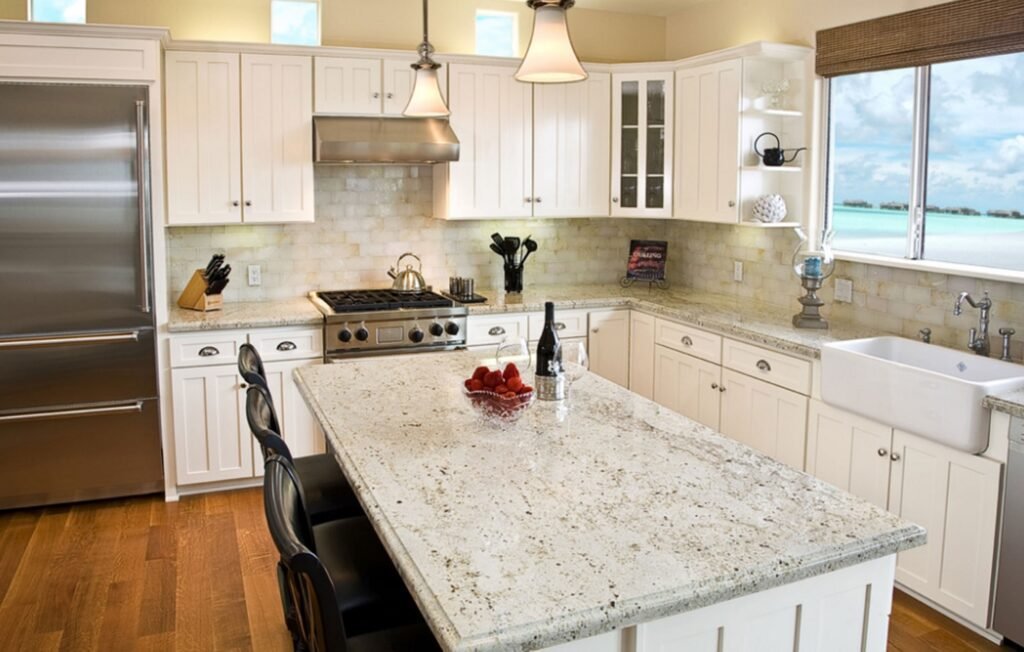Natural stone countertops such as granite, marble, travertine or limestone are good-looking and hard-wearing. However, these natural stone products have a certain degree of porosity. Therefore, after installation, they must be cleaned and sealed. Depending on the variety of stone as well as the amount of sealer treatment the stone has had, the porosity between them will differ greatly.
Photo by Marble Yard – Granite – Orange County, Anaheim – Look for kitchen pictures
Your granite countertops will be sealed prior to installation, but routine maintenance is required to keep them looking new.
The darker a stone is the less porous it is and the lighter it is the more porous it is. For example, a highly polished, dark granite countertop is much less porous than a honed travertine floor.
The porosity of a stone directly affects cleaning methods of natural stone as well as the daily maintenance required.
There are many products advertised to care for granite. The problem for those of us who are looking for green ways of cleaning our homes is that some commercial cleaners are often full of potentially toxic chemicals.
Today, many families are looking for ways to cut down on the amount of toxic or specialty cleaners they purchase. Spraying these toxic chemicals onto a surface which is used for food preparation really doesn’t make sense for our health. Not to mention the environmental effect of these chemicals or the burden on the family budget. When it comes to cleaning your granite countertops there’s no need to make a sacrifice.
Luxury Touch – Glass Countertops | How To Build A House (howtobuildahouseblog.com)
By using a few inexpensive and natural products you probably already have in your home, you can keep your granite countertops looking good all the time.
1. Choose an easy daily routine to clean granite. Warm/hot water and a soft cloth (microfiber works really well) should be sufficient for your countertops on a daily basis. To prevent water spots, always be sure to dry your countertops thoroughly with a fresh soft cloth.
NOTE: Use distilled water rather than city water, just in case there is high chlorination or other mineral content.
2. Wipe up spills as soon as they happen. Though granite is a stain-resistant material, messes that are left for a long time can result in a stain. Acidic foods such orange juice may etch the surface of the granite if allowed to sit. If something spills, get to it as soon as you can and blot rather than wipe to avoid spreading the spill.
3. Make up a solution of vinegar and water. Make the mixture one part vinegar to three parts water in a spray bottle. Use the solution for everyday cleaning. Simply spray it on and wipe it off with a clean cloth. Vinegar is a natural degreaser and will leave your granite countertop shining, without streaks.
4. Rubbing alcohol with water. To make home-made granite counter spray, mix rubbing alcohol 50/50 with water. This gives you a quick ph neutral cleaning spray for your granite countertops. Just spray and wipe with a clean cloth.
5. Hot water with a few drops of gentle dish soap. To get rid of grease after a cooking session, wipe down with hot soapy water. Immediately after, rinse with a clean cloth dipped in hot water. If you don’t rinse, the surface of the granite will look “smeary” with the soap residue.
A microfiber cloth is one of the most effective things to use for the final wipe because it absorbs all the water and soap leaving the surface clean and shiny.
6. Make a paste from baking soda to eliminate stubborn stains. Such stains include coffee rings, dried on food and drink spills that are very sticky. Wipe the area to get rid of excess oil and then apply the paste and leave it for 24 hours. Apply the baking soda paste with a damp cloth, lightly dampened recycled paper towel or even with your fingers. After that you can wipe down. The paste will draw out the stain.
For oil-based stains, use a poultice of baking soda and mineral spirits.
For organic stains, use a poultice of baking soda and hydrogen peroxide.
7. Protect your granite from damage. It’s a lot easier to take preventative measures against stains and scratches than to try to deal with them. For your granite countertops, use coasters for drinks and trivets/pot holders for hot items.

